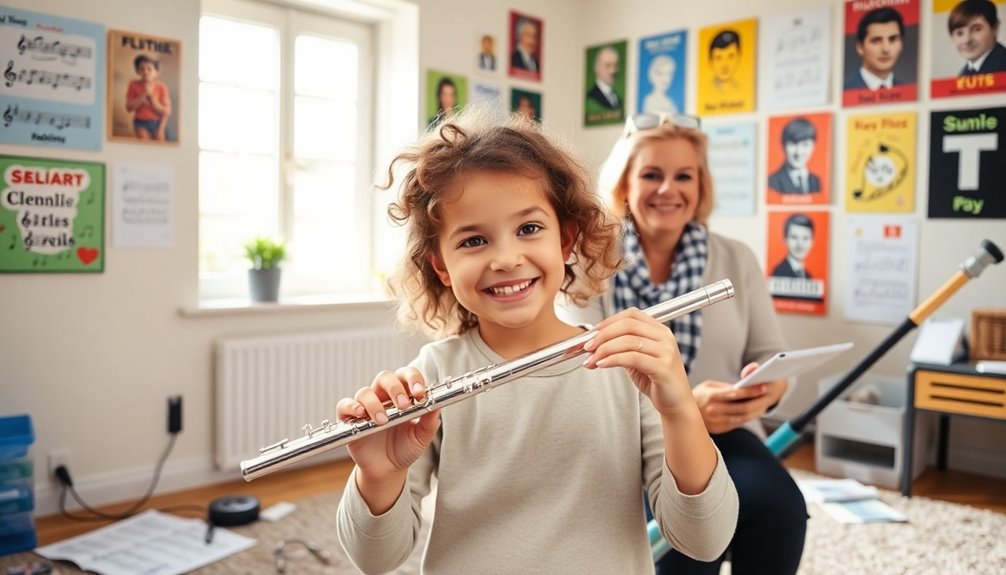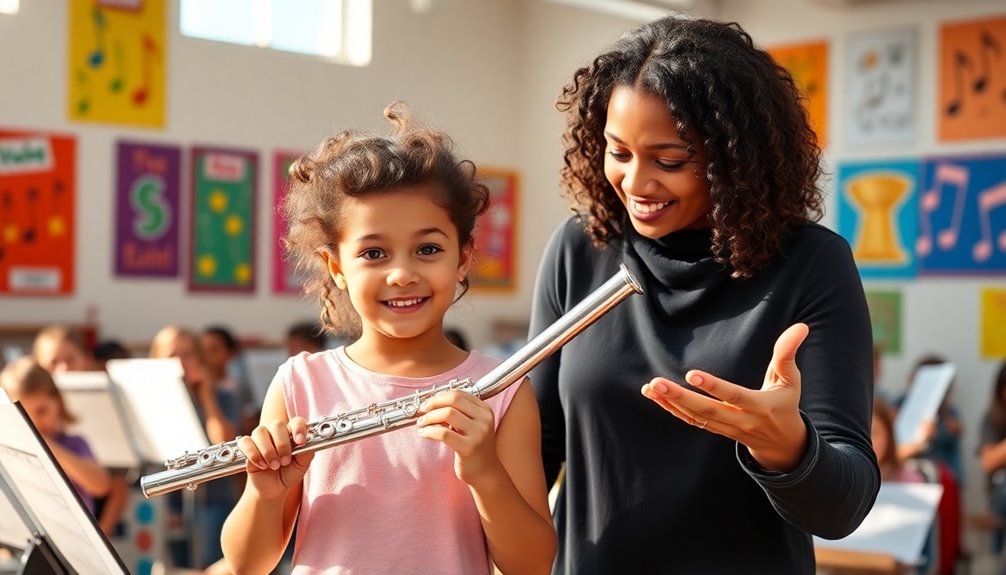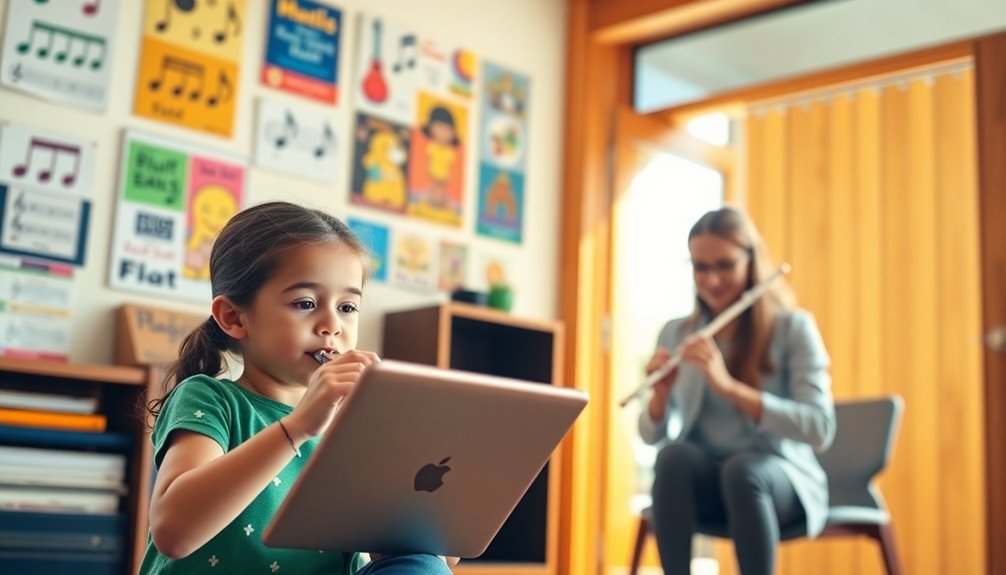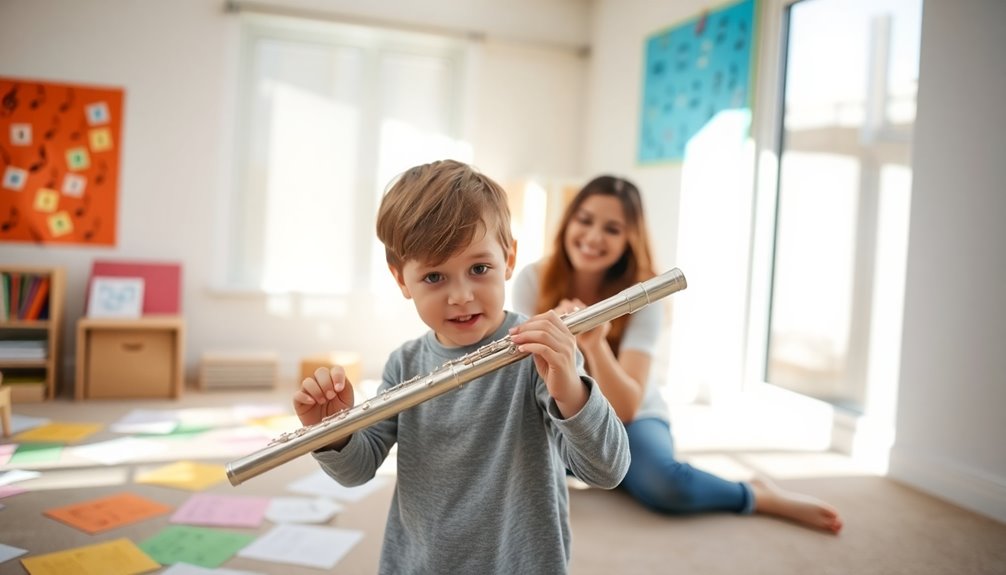Finding affordable flute lessons for your kids is easier than you might think. Start by checking local community music schools or centers for discounted classes. Look for nonprofit organizations offering scholarships or sliding scale fees. Online platforms connect you with experienced instructors at lower rates, giving you flexibility and diverse teaching styles. Consider local college students or flute enthusiasts who offer private lessons at reduced prices. Equip your child with engaging method books and beginner accessories to enhance their learning. With the right resources, your child can thrive in music, and there's so much more to explore as you support their journey.
Key Takeaways
- Look for local community centers and music schools offering discounted flute lessons for children.
- Explore online platforms that connect students with experienced instructors at lower rates.
- Investigate nonprofit organizations that provide scholarships or sliding scale fees for music lessons.
- Seek seasonal workshops or camps for immersive learning experiences during school breaks.
- Utilize beginner flute method books and online resources for supplemental learning at home.
Benefits of Learning the Flute

Learning to play the flute offers kids a wonderful blend of benefits that extend far beyond just music. When your child picks up this beautiful instrument, they're not only diving into the world of melodies but also enhancing their cognitive development. The process of learning to read music, understand rhythm, and play notes builds valuable skills that translate into other areas of life.
As your child practices, they'll experience significant musical benefits. They'll develop a keen sense of pitch and tone, which can boost their overall musicality. Playing the flute encourages discipline and patience, as mastering techniques and pieces requires consistent effort. This discipline can spill over into their academic life, where focus and determination are key to success.
Moreover, studies show that music education can improve brain functions such as memory, attention, and problem-solving skills. When kids engage in playing the flute, they stimulate areas of the brain responsible for these cognitive abilities, making them sharper learners in the classroom. Additionally, the affordability and quality of beginner flutes like the Rhythm C Flutes can make it easier for families to invest in their child's musical journey.
Playing in groups or ensembles fosters teamwork and social skills, too. Your child will learn the importance of collaboration, listening to others, and finding their place within a musical context. This sense of belonging can create lasting friendships and a supportive community.
Finding Affordable Lessons

Finding affordable flute lessons doesn't have to be an intimidating task. Start by exploring options in your local community. Many music schools and community centers offer discounted classes for kids. These programs not only provide great instruction but also foster a sense of belonging among young musicians.
Being part of a group can make learning more enjoyable and motivating for your child.
Next, check if your area has any nonprofit organizations dedicated to music education. These organizations often provide scholarships or sliding scale fees, making lessons accessible for families on a budget.
Don't hesitate to reach out and ask about available options—many are enthusiastic to help kids discover their musical potential.
Another great resource is online platforms that connect students with experienced instructors. Some offer promotional rates or group lessons at lower prices. Plus, these sessions often take place in a relaxed, supportive environment that can boost your child's confidence. Consider looking for platforms that provide structured lessons to enhance your child's learning experience.
You can also search for local flute enthusiasts or college students offering private lessons at a reduced rate. They might be looking to gain teaching experience or simply share their love for music with others.
Lastly, don't forget to look for seasonal workshops or camps during school breaks. These can be a fun way for your child to immerse themselves in music without breaking the bank.
With a little research and creativity, you can find affordable flute lessons that inspire your child and nurture their passion for music.
Online vs. In-Person Classes

When deciding between online and in-person flute classes, consider your child's learning style and preferences. Each option has its unique benefits, and understanding these can help you make the best choice for your budding musician.
Online platforms offer flexibility and convenience, allowing your child to learn from home at their own pace. This can be particularly beneficial for busy families, as you can schedule lessons around other commitments. Many online instructors provide interactive tools and resources that can enhance the learning experience, making it engaging and fun.
Plus, your child can connect with talented teachers from around the globe, giving them access to diverse teaching styles and techniques. Additionally, many online resources focus on instruments like the recorder flute, which is recognized for its accessibility and ease of learning for beginners.
On the other hand, local studios provide a more traditional approach, fostering a sense of community and connection. In-person classes allow for immediate feedback and personal interaction, which can be essential for younger students who thrive on encouragement and social engagement.
Students often benefit from the structured environment of local studios, where they can meet other aspiring flutists and participate in group activities.
Ultimately, the choice between online and in-person lessons should reflect your child's personality and preferences. If they enjoy socializing and thrive on direct interaction, local studios might be the way to go.
However, if they prefer flexibility and independence, online platforms could be the perfect fit. Whatever you choose, make sure it aligns with your child's needs and helps them grow as a musician.
Recommended Resources for Beginners

Your child's journey into the world of flute playing can be greatly enriched by the right resources. Start by investing in quality flute method books that cater specifically to beginners. These books often include step-by-step instructions, exercises, and a variety of fun songs to keep your child engaged.
Look for titles like "Essential Elements for Band – Flute" or "Rubank Elementary Method for Flute," which are popular choices among educators and young learners alike.
In addition to method books, beginner flute accessories are essential for a smooth learning experience. Consider getting a good cleaning kit, which helps maintain the flute's condition and can teach your child about instrument care.
A comfortable flute stand can also encourage practice by making it easy for your child to pick up and play whenever inspiration strikes.
Don't forget about sheet music! Access to beginner sheet music, available online or in music stores, gives your child the chance to explore different genres. Encourage them to play pieces they love, whether it's pop songs or classical favorites.
Finally, online resources like video tutorials and interactive apps can supplement your child's learning. Websites like YouTube have countless instructional videos that can make practice sessions more enjoyable and visually engaging. Additionally, understanding flute maintenance is crucial for ensuring your child's instrument remains in optimal condition throughout their learning journey.
Tips for Parents Supporting Learning

As your child begins their flute-learning adventure, your support can make all the difference in their progress and enjoyment. Parent involvement is vital at this stage, as it not only boosts their confidence but also fosters a deeper love for music. Attend their lessons when possible and engage with their instructor to understand how you can contribute to their learning experience.
Create a positive atmosphere at home that encourages exploration and creativity. Celebrate small victories, whether it's mastering a new note or completing a practice session. Positive reinforcement goes a long way in motivating your child. You might say, "I'm so proud of how you're improving!" or "Your dedication is inspiring!" These affirmations help build their self-esteem and reinforce the idea that practice leads to growth.
Establish a consistent routine for practice. While it's important to make this fun, structure can also help your child feel more committed. Set aside specific times during the week where they can focus solely on their flute; this will show them that you value their efforts. Additionally, consider investing in a nickel silver flute, as these are durable and affordable options for beginners.
Finally, encourage them to share their progress with family and friends. Performing—even in a casual setting—can ignite their passion and strengthen their connection to music. Your active involvement not only enhances their learning but creates unforgettable memories that you both will cherish.
With your support, your child's flute journey can become a fulfilling and joyful experience.
Encouraging Practice and Progress

Regular practice is essential for mastering the flute, and finding ways to encourage this can make a significant difference in your child's progress. Start by establishing consistent practice routines. Set aside a specific time each day for practice, making it a fun part of their daily schedule. Your child will feel more motivated if they see this time as a commitment to their music journey rather than a chore.
To keep things engaging, try incorporating a variety of activities into their practice sessions. Mixing warm-ups, scales, and pieces they enjoy can help maintain their interest and enthusiasm. You can also introduce short practice goals, like learning a new measure or mastering a challenging passage, which can boost their confidence as they achieve these targets.
Progress tracking is another effective way to encourage your child. Create a simple chart to log their daily practice time and note what they worked on. This visual representation can be incredibly motivating, as they can see their dedication translate into improvement. Celebrate these milestones together—whether that's mastering a song or completing a week of consistent practice.
Lastly, foster a supportive environment by engaging with your child about their flute journey. Encourage them to share their experiences, struggles, and triumphs. When they feel seen and heard, they'll be more likely to embrace their practice and continue progressing. Additionally, consider investing in a quality beginner flute from brands like Yamaha Flutes, which are known for their reliability and ease of play.
Frequently Asked Questions
What Age Is Best for a Child to Start Flute Lessons?
The best age for your child to start flute lessons is typically around 8 to 10 years old.
At this age, kids can better grasp the instrument's techniques and enjoy its benefits. Starting early supports their musical development, helping them cultivate discipline, creativity, and social skills.
Plus, learning the flute can be a fun way for your child to connect with others who share similar interests, fostering a sense of belonging.
How Long Should Each Flute Practice Session Be for Kids?
When it comes to how long each flute practice session should be, short practice sessions of about 15-20 minutes work best for kids. This keeps their attention focused and helps them absorb what they're learning.
You can incorporate effective practice techniques, like warm-ups and fun songs, to make the most of that time. Encouraging regular, consistent practice fosters a sense of achievement and belonging in their musical journey.
Enjoy the process together!
Are There Specific Brands of Flutes Recommended for Beginners?
When you're looking for beginner flute brands, consider options like Yamaha, Gemeinhardt, and Armstrong.
These student flute options are designed with newcomers in mind, offering good sound quality and durability. They're lightweight and easy to handle, making practice enjoyable.
Plus, you'll find them at various price points, ensuring you can choose one that fits your budget. Starting with the right instrument can make all the difference in your musical journey!
Can Kids Learn to Play Flute Without Prior Musical Experience?
Absolutely, kids can learn to play the flute without prior musical experience!
In fact, studies show that around 70% of beginner musicians start this way. By focusing on flute fundamentals and using effective learning strategies, they can quickly grasp the basics.
Encourage them to practice regularly and explore different styles of music.
With patience and guidance, they'll not only master the instrument but also gain confidence and a sense of belonging in the music community.
What Should I Do if My Child Struggles With Learning the Flute?
If your child struggles with learning the flute, it's crucial to stay positive. Use encouragement strategies like celebrating small victories to boost their confidence.
Incorporate practice techniques that make learning fun, such as playing along with their favorite songs or using games. Break lessons into manageable sections to avoid overwhelming them.
Conclusion
In summary, exploring affordable flute lessons for your child can open up a world of musical potential. While some might think that quality lessons always come at a high price, the truth is that dedicated teaching can be found in various formats—both online and in-person. By supporting their journey and encouraging consistent practice, you're not just nurturing a budding musician; you're also fostering discipline and creativity that'll benefit them in countless ways. So, let the music begin!






